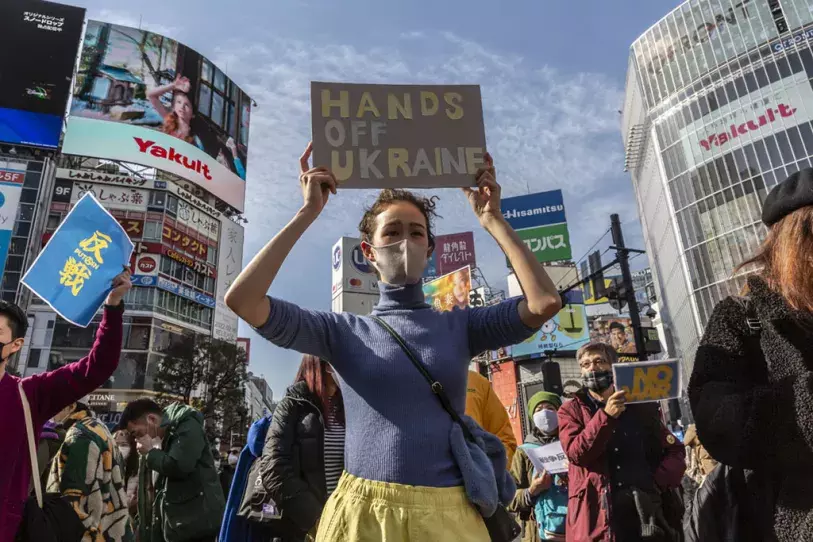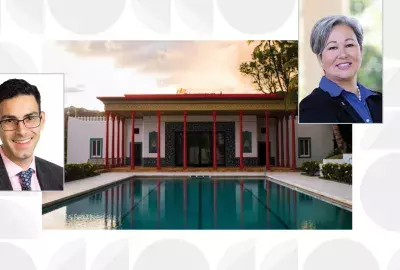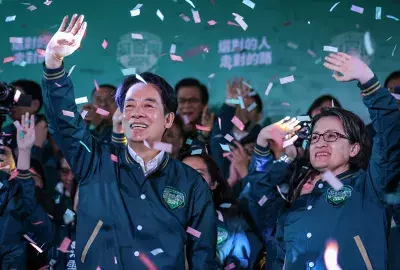Error message

In some ways, the crisis in Europe has strengthened US relationships in Asia and the Pacific, says East-West Center VP Satu Limaye
Quick Take:
- Key regional meetings and initiatives continue with Asia and the Pacific.
- The Ukraine invasion has heightened regional concerns about China’s aggressive behavior and its deepening relationship with Russia.
- The biggest gap in US policy in the region is a comprehensive economic initiative.
HONOLULU (May 5, 2022) -- Although Russia’s invasion of Ukraine clearly requires the full attention of the Biden administration, there is no sign that the land war in Eastern Europe is detracting from the administration’s enhanced long-term focus on Asia, East-West Center Vice President Dr. Satu Limaye said in a recent EWC Insights talk. (View video.)
Just days before Russia invaded Ukraine, the White House released its Indo-Pacific Strategy, providing continuity in the US policy of prioritizing the region and the growing threat of China. In addition, he said, the US has continued to hold important meetings with key regional partners, and in fact Russia’s attack on its neighbor has in some ways strengthened US relations with key Indo-Pacific allies.
“I would argue that key allies like Australia, Japan, the Republic of Korea, New Zealand, Singapore, and Taiwan have all been very important in the response to the Ukraine invasion,” said Limaye, who directs the Honolulu-based East-West Center’s office in Washington, DC.
Continued cooperation despite differences
Although India and Vietnam declined to condemn Russia in the UN General Assembly, that was hardly a surprise given the two countries’ longstanding friendly relations with Moscow, Limaye said. And that difference of opinion has not derailed India’s active participation in the “Quad” security dialogue with the US, Japan, and Australia, which focuses on how to deal with China’s growing power and influence in the region.
The Association of Southeast Asian Nations has had a rather fractured response, but any differences of opinion will not stand in the way of, for example, holding a special ASEAN-US summit in Washington next week, according to Limaye. “The overall Asian response to the Ukraine crisis has cemented and facilitated good relations in the region,” he said.
The China factor
Part of the reason for that coherence is that Russia’s invasion has heightened regional concerns about China’s efforts to increase its sway over the region, as well as the increasingly close relationship between Russia and China, Limaye said. The invasion has also increased scrutiny of China’s saber-rattling toward Taiwan in the past year, though it is possible that Russia’s early military failures have given Beijing cause to reassess its own capabilities to carry out complex military operations against a determined local population.
As for US-China relations, Russia’s invasion and its deepening alliance with China have increased questions about whether the US and China are heading for an even more severe decoupling and further de-globalization. The possibility exists, he said, that the effectiveness of Western sanctions on Russia may cause “China to consider further actions to delink from the international financial system, via crypto, barter arrangements, or more use of the renminbi (Chinese currency).”
Emerging alliances and an economic framework
Events in Eastern Europe have also served to strengthen a trend in the Indo-Pacific towards what Limaye characterized as ‘bespoke’ alliances as complements to the existing major multilateral institutions such as ASEAN and APEC. Pointing to the Quad as well as the Australia, United Kingdom and US (AUKUS) security arrangements as examples, he said this does not mean an abandonment of the traditional multilateral institutions but an increased emphasis on these new alliances.
While some countries already had mixed views of regional organizations, he noted, “the new bespoke organizations generally are accepted in the region because they are a sign of engagement and commitment of the United States.”
On efforts to boost economic activity within the region, Limaye said that “the most important unmet need in the region right now is the US commercial and economic strategy.” Part of the new US Indo-Pacific Strategy will be an attempt to try to regain the momentum that was lost when the Trump administration withdrew from the Trans-Pacific Partnership, through a new effort termed the Indo-Pacific Economic Framework.
Although promising in terms of boosting American economic involvement in the region, there are few details as yet of how this would work. Perhaps most concerning, according to Limaye, is that there is no sign of support for increased access to the US market. Until such a regional economic strategy can be sorted out, he said, other issues such as multilateralism, ongoing alliances and partnerships will remain of less interest.
Facing unknowns
Around half of the world’s population, as represented in the United Nations, did not support resolutions condemning Russia’s invasion of Ukraine, Limaye pointed out. Partially this is due to the West’s own inconsistent behavior in places like Syria and Iraq. But there is also a sense of resentment about how the West applies economic sanctions, he said, and this dissonance will not go away quickly.
“My net assessment of US-Indo-Pacific relations after Ukraine are generally manageable, constructive, cooperative, and productive,” Limaye concluded. But he said we are left with several important unknowns, including whether the Indo-Pacific will remain stable if China continues its aggressive behavior, and whether the Sino-Russian alliance will progress far enough to become a precursor of a new Cold War situation in the region.
These questions will remain unanswered for at least as long as Russia’s war against Ukraine continues, Limaye said, but it is important that regional policymakers keep them uppermost in their minds in the months and perhaps years ahead.
Photo: Supporters of Ukraine rally in Tokyo in February. Credit: Yuichi Yamazaki/Getty Images
In some ways, the crisis in Europe has strengthened US relationships in Asia and the Pacific, says East-West Center VP Satu Limaye
Quick Take:
- Key regional meetings and initiatives continue with Asia and the Pacific.
- The Ukraine invasion has heightened regional concerns about China’s aggressive behavior and its deepening relationship with Russia.
- The biggest gap in US policy in the region is a comprehensive economic initiative.
HONOLULU (May 5, 2022) -- Although Russia’s invasion of Ukraine clearly requires the full attention of the Biden administration, there is no sign that the land war in Eastern Europe is detracting from the administration’s enhanced long-term focus on Asia, East-West Center Vice President Dr. Satu Limaye said in a recent EWC Insights talk. (View video.)
Just days before Russia invaded Ukraine, the White House released its Indo-Pacific Strategy, providing continuity in the US policy of prioritizing the region and the growing threat of China. In addition, he said, the US has continued to hold important meetings with key regional partners, and in fact Russia’s attack on its neighbor has in some ways strengthened US relations with key Indo-Pacific allies.
“I would argue that key allies like Australia, Japan, the Republic of Korea, New Zealand, Singapore, and Taiwan have all been very important in the response to the Ukraine invasion,” said Limaye, who directs the Honolulu-based East-West Center’s office in Washington, DC.
Continued cooperation despite differences
Although India and Vietnam declined to condemn Russia in the UN General Assembly, that was hardly a surprise given the two countries’ longstanding friendly relations with Moscow, Limaye said. And that difference of opinion has not derailed India’s active participation in the “Quad” security dialogue with the US, Japan, and Australia, which focuses on how to deal with China’s growing power and influence in the region.
The Association of Southeast Asian Nations has had a rather fractured response, but any differences of opinion will not stand in the way of, for example, holding a special ASEAN-US summit in Washington next week, according to Limaye. “The overall Asian response to the Ukraine crisis has cemented and facilitated good relations in the region,” he said.
The China factor
Part of the reason for that coherence is that Russia’s invasion has heightened regional concerns about China’s efforts to increase its sway over the region, as well as the increasingly close relationship between Russia and China, Limaye said. The invasion has also increased scrutiny of China’s saber-rattling toward Taiwan in the past year, though it is possible that Russia’s early military failures have given Beijing cause to reassess its own capabilities to carry out complex military operations against a determined local population.
As for US-China relations, Russia’s invasion and its deepening alliance with China have increased questions about whether the US and China are heading for an even more severe decoupling and further de-globalization. The possibility exists, he said, that the effectiveness of Western sanctions on Russia may cause “China to consider further actions to delink from the international financial system, via crypto, barter arrangements, or more use of the renminbi (Chinese currency).”
Emerging alliances and an economic framework
Events in Eastern Europe have also served to strengthen a trend in the Indo-Pacific towards what Limaye characterized as ‘bespoke’ alliances as complements to the existing major multilateral institutions such as ASEAN and APEC. Pointing to the Quad as well as the Australia, United Kingdom and US (AUKUS) security arrangements as examples, he said this does not mean an abandonment of the traditional multilateral institutions but an increased emphasis on these new alliances.
While some countries already had mixed views of regional organizations, he noted, “the new bespoke organizations generally are accepted in the region because they are a sign of engagement and commitment of the United States.”
On efforts to boost economic activity within the region, Limaye said that “the most important unmet need in the region right now is the US commercial and economic strategy.” Part of the new US Indo-Pacific Strategy will be an attempt to try to regain the momentum that was lost when the Trump administration withdrew from the Trans-Pacific Partnership, through a new effort termed the Indo-Pacific Economic Framework.
Although promising in terms of boosting American economic involvement in the region, there are few details as yet of how this would work. Perhaps most concerning, according to Limaye, is that there is no sign of support for increased access to the US market. Until such a regional economic strategy can be sorted out, he said, other issues such as multilateralism, ongoing alliances and partnerships will remain of less interest.
Facing unknowns
Around half of the world’s population, as represented in the United Nations, did not support resolutions condemning Russia’s invasion of Ukraine, Limaye pointed out. Partially this is due to the West’s own inconsistent behavior in places like Syria and Iraq. But there is also a sense of resentment about how the West applies economic sanctions, he said, and this dissonance will not go away quickly.
“My net assessment of US-Indo-Pacific relations after Ukraine are generally manageable, constructive, cooperative, and productive,” Limaye concluded. But he said we are left with several important unknowns, including whether the Indo-Pacific will remain stable if China continues its aggressive behavior, and whether the Sino-Russian alliance will progress far enough to become a precursor of a new Cold War situation in the region.
These questions will remain unanswered for at least as long as Russia’s war against Ukraine continues, Limaye said, but it is important that regional policymakers keep them uppermost in their minds in the months and perhaps years ahead.
Photo: Supporters of Ukraine rally in Tokyo in February. Credit: Yuichi Yamazaki/Getty Images
East-West Wire
News, Commentary, and Analysis
The East-West Wire is a news, commentary, and analysis service provided by the East-West Center in Honolulu. Any part or all of the Wire content may be used by media with attribution to the East-West Center or the person quoted. To receive East-West Center Wire media releases via email, subscribe here.
For links to all East-West Center media programs, fellowships and services, see www.eastwestcenter.org/journalists.







